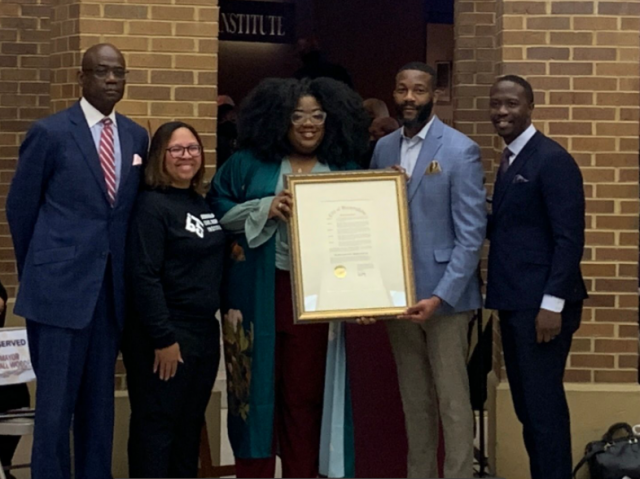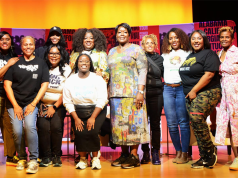
By Ryan Michaels
The Birmingham Times
Birmingham on Friday honored the Reverend Fred L. Shuttlesworth, the city’s most prominent Civil Rights leader.
Mayor Randall Woodfin, surrounded by city school students, local clergy and residents inside the Birmingham Civil Rights Institute (BCRI), issued a proclamation declaring for the first time March 18 Reverend Fred Shuttlesworth Day, the 100th anniversary of the leader’s birth.
A statue of Shuttlesworth already stands outside the institute, and the city’s airport is named in his honor.
“Without Rev. Fred Shuttlesworth, Birmingham, as we know it today, would likely not exist,” Woodfin said. “It was due to his courage. It was due to his determination. It was due to his unquenchable thirst for justice that Birmingham now stands as an example of what progress is and how to make change.”
Shuttlesworth, who died in 2011 at age 89, served as pastor of Bethel Baptist Church in Collegeville from 1953 to 1961. He had been jailed nearly 40 times for his fight to dismantle segregation and endured numerous beatings and bombings, both of his house and church. He has been quoted several times as saying, “I tried to get killed in Birmingham,” believing death was the only thing that would bring national attention to the racial injustice in the city.
Rev. Thomas Wilder, who currently serves as lead pastor at Bethel Baptist, said Shuttlesworth’s religious faith made him humble about his work.
“[Shuttlesworth] said, ‘Y’all think I’m great, but I don’t think I’m great.’ He said, ‘The only thing I did was to do what God called me to do,’ and he said, ‘If I were to have died doing that, then it will be all the better,’” Wilder recalled. “…He was relentless. If you’re going to do anything, you’ve gotta be relentless.”
Bishop Calvin Woods said Shuttlesworth, who co-founded the Alabama Christian Movement for Human Right, helped save Birmingham through his organization.
“This city has been born again because people stood up and protested against what was ,” Woods said
Woodfin told a gathering of about 50, that included students from Ramsay and Holy Family Cristo Rey High Schools, the life and work of Shuttlesworth give several important lessons for people today.
“He taught us that change does not come over night, but that it’s the result of coordination, perseverance and my favorite, courage,” the mayor said. “He taught us that our family extends beyond blood. It includes our community. Even today, that blended family is who we are responsible for fighting for, who we risk our lives for and who we stand in arms with…He taught us that the real magic in this city lies in its unbreakable spirit.”
Woodfin said people disagree on whether Birmingham, Selma, Atlanta or another city is the “cradle” of the Civil Rights Movement but that Shuttlesworth’s work here was crucial, despite the disagreement.
“If any of those [cities] were the ‘Cradle of the Movement’ rest assured that Birmingham was the battleground of the Civil Rights Movement, and it was Rev. Fred Shuttlesworth who was on the frontline of freedom,” Woodfin said.
Shuttlesworth made Birmingham what it is today, the mayor added.
“We are a reflection of his spirit. We are a reflection of his fortitude. We are a reflection of his victory because if not for the Rev. Fred Shuttlesworth, we would not be here today,” Woodfin said.




